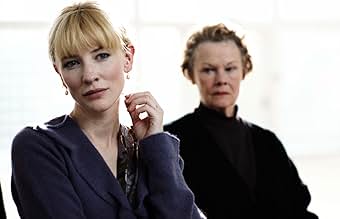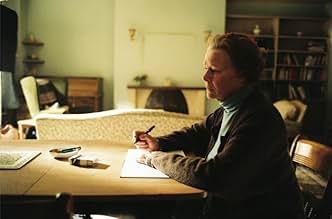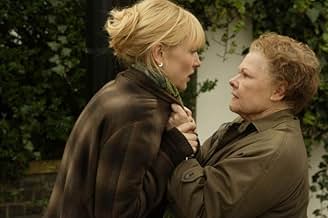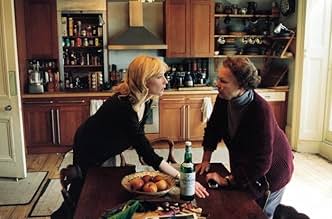एक अनुभवी हाई स्कूल शिक्षक एक युवा कला शिक्षक से दोस्ती करता है, जिसका उसके पंद्रह वर्षीय छात्रों में से एक के साथ संबंध है. हालाँकि, इस नए "दोस्त" के साथ उसके इरादे भी एक निष्काम दोस्ती से ... सभी पढ़ेंएक अनुभवी हाई स्कूल शिक्षक एक युवा कला शिक्षक से दोस्ती करता है, जिसका उसके पंद्रह वर्षीय छात्रों में से एक के साथ संबंध है. हालाँकि, इस नए "दोस्त" के साथ उसके इरादे भी एक निष्काम दोस्ती से परे हैं.एक अनुभवी हाई स्कूल शिक्षक एक युवा कला शिक्षक से दोस्ती करता है, जिसका उसके पंद्रह वर्षीय छात्रों में से एक के साथ संबंध है. हालाँकि, इस नए "दोस्त" के साथ उसके इरादे भी एक निष्काम दोस्ती से परे हैं.
- 4 ऑस्कर के लिए नामांकित
- 16 जीत और कुल 74 नामांकन
फ़ीचर्ड समीक्षाएं
From a distance you could see this film as yet another entry into the Fatal Attraction / Single White Female genre in the way that it is essentially about a "normal" relationship that turns sour as it becomes steadily more evident that the "normal" person is actually a tad unhinged. However does this mean that we are going through the motions here and that we will end up with a Dench/Blanchett fight like it's some sort of Bafta Special of Celebrity Wrestling? Well thankfully no. The narrative does head this way to a point of course but it remains engaging and grounded, mainly down to the fact that the story is not strictly one of this specific relationship but rather it is the story of Barbara. This is clear from the fact that the only narration or inner thoughts we get to hear are from her and, although it is not told from her perspective, it is clear that she is the subject of the film rather than Sheba (who is Barbara's subject).
The film paints out a convincingly real Barbara and in a way she reminded me a little of the "Lady of Letters" from Alan Bennett's Talking Heads. In her own world and journal she has developed this aloof attitude of one who is lonely but has convinced herself that she is more than happy to be so. But yet she also still has this edge of desperation, of being so much more needy than she will ever recognise. It is a very well written part and it goes without saying that Dench plays it perfectly delivering in the detail and reigning in any potential for "bunny boiling". The story is well delivered and it is the characters that prevent you really questioning the internal logic too much because it does all convince both within itself but more or less within the wider world as well.
Eyre's direction is good in terms of controlling his cast even if it does feel every inch a BBC TV film that has gotten ahead of itself. Blanchett works well opposite Dench; she knows that the film is not about her character even if her character is key in telling it and her performance is pitched well to reflect this. As another user has already humorously said, Bill Nighy is good as the Bill Nighy character but I was upset that Phil Davis did not get more to do as he is very good at the type of character he played here. Simpson is well cast and makes his character work pretty well considering the demands put on him by the narrative something about his Northern Irish accent that makes me believe it (!).
Overall then an engaging and well-delivered film. At first glance it is another crazy stalker movie but really it is much more than that as the characters are well written and convincing (even if aspects of the narrative aren't to the same degree) and the strength of the lead performances almost goes without saying as a given.
Dench and Blanchett, as Barbara and Sheba, share not only a gift for deep behavioral detail but a skill at withholding or telegraphing charm and beauty, as required. This may be one of the numerous reasons why they're as compelling as they are. It's definitely part of why this is some of their finest work. It's part of the drama's mechanism. Were Sheba not the breed of beauty she is, a naive, impressionable, coddled pixie, then we couldn't appreciate how intensely Barbara wants her. It's not exactly love so much as controlling, envious fixation on Sheba's stunning upper-class ease. And were Barbara not a teakettle of seclusion boiling through decades of disillusionment, we couldn't identify with how distorted the manifestation of that affection becomes.
That's the marvel of the movie: It's about the venomous influence of loneliness, viewed through a tale of two people in love. But unfortunately for both, not with one another. Sheba becomes smitten with a cute but cagey student. Played with what seems like natural hyper-confidence by Andrew Simpson, he sees an occasion in the way she looks at him. She has no clue of how defenseless she truly is. It's not only dishonest and unethical, she tells herself, it's totally ludicrous, but when he cups her face and says, "You're beautiful, Miss," she melts.
Barbara, meanwhile, fosters an obsession in her diary, relating thoughts precariously bordering on fantasy. Barbara's seclusion within the school is total, but Sheba is somebody who hasn't experienced her acidity. Barbara can smother someone with good turns and not be rejected. She helps Sheba win control of her students. "One soon learns that teaching is crowd control. We're a branch of social services." Sheba asks her to Sunday roast, where Barbara describes Sheba's family with characteristically rancorous humor. Dench's delivery of these delectably spiteful lines is an triumph in vocal meticulousness and tone that is its own prize. Even when this apparent ice queen drops minute words of vulnerability like "Is that why she hasn't returned my calls?" there's an extra intensity in how strongly we can all relate to the insecurities of her inner voice.
There are giftedly handled, extraordinarily candid scenes of rage, humiliation and disgrace, and cruel physical and emotional clashes of immense force. The teachers are somewhat caricatured, but that's because they're filtered through Barbara's misanthropic viewpoint. If it's her omniscient voice we're hearing, it's through her omniscient eyes we're seeing what she describes, and it's the figures who allow her access to their humanity who have profundity and delicacy in their depictions. A wholly earnest Dench brings to Barbara that frigid reserve that's somehow one with a despairing need for consolation and affection. Early on, Sheba is basically an alluring figurine, watched from afar. When our voyeuristic chronicler discovers Sheba's business with the student, Sheba grows immense dimension.
We start to see Sheba's own manner of advantaged lonesomeness or just tedium. "Marriage, kids, it's wonderful," she presumingly explains, "but it doesn't give you meaning." Blanchett brilliantly uses her character's advantages to betray her. The grim lesson she's about to learn from Barbara seems belated, even valuable. People like Sheba, according to Barbara, and I'm sure you'll agree, think they know loneliness, but they know nothing of planning one's whole weekend around a laundry errand, or being so continually untouched that the inadvertent sweep of a stranger's hand ignites years of sexual longing.
What I adore about the film is this discerningly intricate moral kaleidoscope weaved in completely modern domestic terms. It's going on in your neighborhood, not just Islington. There are scandals like this every year, and we dismissively conjecture from what little we gather. The cunning concept here is that we're seeing it through the sieve of Barbara, and whose transgressions transcend contemporary know-it-all assumptions.
क्या आपको पता है
- ट्रिवियाJason Reitman read the script and wanted to direct it. He called up the producers on the phone with the intention of getting the job. The producers answered: "We are in editing right now, but I hope you'll like the film when it comes out."
- गूफ़When Sheba is rampaging through Barbara's house in search of her journal, you can see a crew member in the mirror behind her as she goes to sit.
- भाव
Barbara Covett: People like Sheba think they know what it is to be lonely. But of the drip, drip of the long-haul, no-end-in-sight solitude, they know nothing. What it's like to construct an entire weekend around a visit to the launderette. Or to be so chronically untouched that the accidental brush of a bus conductor's hand sends a jolt of longing straight to your groin. Of this, Sheba and her like have no clue.
- कनेक्शनFeatured in Siskel & Ebert & the Movies: The Best Films of 2006 (2006)
- साउंडट्रैकFunky Kingston
Written by Toots Hibbert (as Frederick Hibbert)
Performed by Toots & The Maytals (as Toots and the Maytals)
Produced by Leslie Kong
Reproduced by kind permission of Blue Mountain Music Ltd.
Administered by Fairwood Music (UK) Ltd. (c) 1971
Courtesy of Universal-Island Records Ltd.
Under licence from Universal Music Operations Ltd.
Courtesy of D&F Music Frederick Hibbert
टॉप पसंद
- How long is Notes on a Scandal?Alexa द्वारा संचालित
विवरण
- रिलीज़ की तारीख़
- कंट्री ऑफ़ ओरिजिन
- आधिकारिक साइट
- भाषाएं
- इस रूप में भी जाना जाता है
- Escándalo
- फ़िल्माने की जगहें
- Parliament Hill, Hampstead Heath, हैम्पस्टेड, लंदन, इंग्लैंड, यूनाइटेड किंगडम(Barbara's park bench overlooking central London)
- उत्पादन कंपनियां
- IMDbPro पर और कंपनी क्रेडिट देखें
बॉक्स ऑफ़िस
- बजट
- $1,50,00,000(अनुमानित)
- US और कनाडा में सकल
- $1,75,10,118
- US और कनाडा में पहले सप्ताह में कुल कमाई
- $4,14,487
- 31 दिस॰ 2006
- दुनिया भर में सकल
- $4,98,14,568
इस पेज में योगदान दें






































